A convenience store that suddenly appeared in Australia just over 20 years ago is now on track to become bigger than 7-Eleven, despite outrage over the high prices of some of its products.
The first EzyMart store opened in Bondi Beach in 2001. The chain now operates 450 stores in New South Wales, Queensland, ACT, Victoria and South Australia.
The man behind the company is founder and CEO Maher Magableh, who emigrated to Australia from a small town in Jordan when he was in his early 20s.
His father encouraged him to take the step because his brothers and cousins were already studying in Australia.
Magableh, who had already represented Jordan in the taekwondo Olympics, then began a postgraduate degree in business management and public relations.
The company’s journey began when Magableh bought a milk bar in Bondi that would later become his first EzyMart.
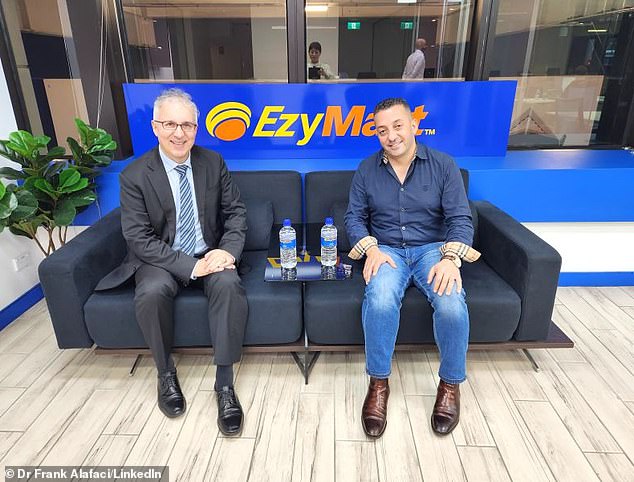
The first EzyMart store opened in Bondi Beach in 2001. The chain now operates 450 stores in New South Wales, Queensland, ACT, Victoria and South Australia (pictured is founder Maher Magableh on the right).
The key to their success was stocking items that many other convenience stores didn’t carry, such as popular overseas snacks like Dr Pepper, Takis chips, and Reese’s chocolate.
His second store came in 2006, when Magableh learned of the closure of a 7-Eleven in Sydney’s Kings Cross.
It opened five more stores that year in Sydney and, by 2012, the business had expanded interstate.
‘It has been hard and different for me, I had to study and work at the same time, in addition to teaching taekwondo,’ he told The Ethnic Business Awards after being a finalist in the medium and large business category in 2021.
Magableh said the Bondi milk bar was extremely dilapidated when he took over.
‘It was very old, the machinery, the refrigerators, the shelves… everything was old. When we took over, we had to clean it for 36 hours,” he said.
He attributed his success to the variety of items available at EzyMarts.
“We always have something new in the stores, it’s different from other convenience stores and supermarkets,” he said.
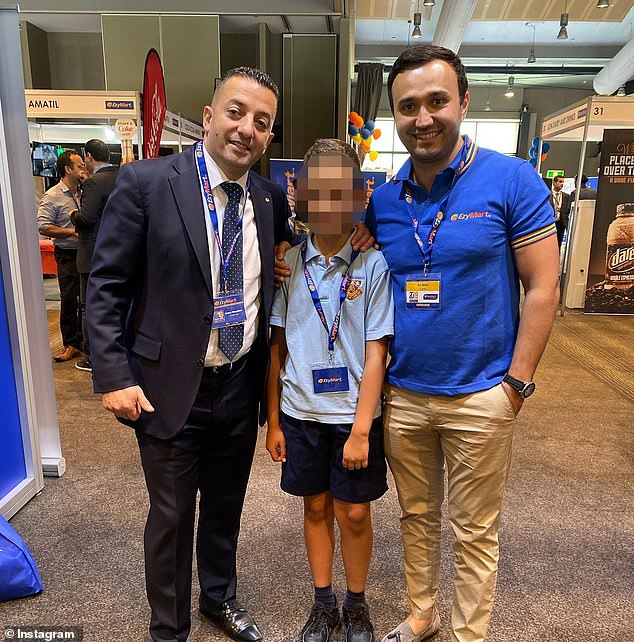

EzyMart claims its success has made it Australia’s leading convenience store chain (pictured left is CEO Maher Magableh, who emigrated to Australia from Jordan when he was 20).
‘Approximately every five years the business doubles. I wish there were more than 24 hours in a day because there are too many things to do in life.’
Magableh also works as a certified taekwondo referee and has judged three different Olympic Games.
EzyMart claims its success has made it Australia’s leading convenience store chain.
But many customers have expressed outrage over the price of basic items.
Most of the time, products also don’t come with price tags, so customers don’t know how much they have to pay until they reach the checkout.
‘The price there is absolutely crazy. Why do we allow absurd costs at EzyMart? one person shared on Reddit last year.
‘That awful! It’s ridiculous that we have absolutely no alternative!’ said another.
A 12-ounce can of soda can cost up to $4.50, while a package of chips can cost $7.
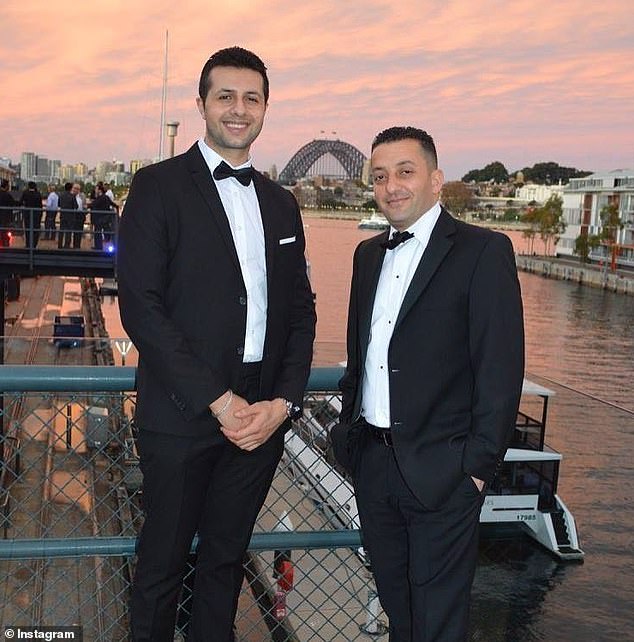

Magableh (right) said the success of their business was due to the variety of items they had available.
Prices can vary at different EzyMarts, but one person claimed they spent $12 on just two bags of chips.
Controversially, EzyMarts also sells illegal vaporizers.
In Australia, it is illegal to purchase or possess e-cigarettes without a prescription from a registered doctor.
While they are not found on convenience store shelves, they can be easily purchased on demand.
Many customers are also surprised by how many EzyMarts there are and how close they are, many of them just hundreds of meters from the next one.
Meg Elkins, a behavioral and applied economist at RMIT University in Melbourne, said the success of franchising was because, for many, high prices didn’t matter as they looked for the most convenient option.
“EzyMarts are always in your mindset, if you need something quickly it’s an easy option,” he told Daily Mail Australia.
‘If people are looking for comfort, price is not a priority. Life is busy and hectic, we want something that’s easy.’
He said while supermarkets like Woolworths and Coles may have the same items at much lower prices, the proximity of EzyMarts, especially in city CBDs, was enough to attract shoppers.
“We like to reduce the effort in our lives, that’s why we use Uber Eats,” Ms Elkins said.
“I think they are conditioning us to take the easy option and they have taken advantage of that and I think the pandemic has conditioned us to take shortcuts.”
The expert also said that for some shoppers, EzyMart was attractive because it meant they would not have to wait in line at supermarkets.
It comes amid fights over competitor 7-Eleven, with the entire business set to go up for sale in May this year.
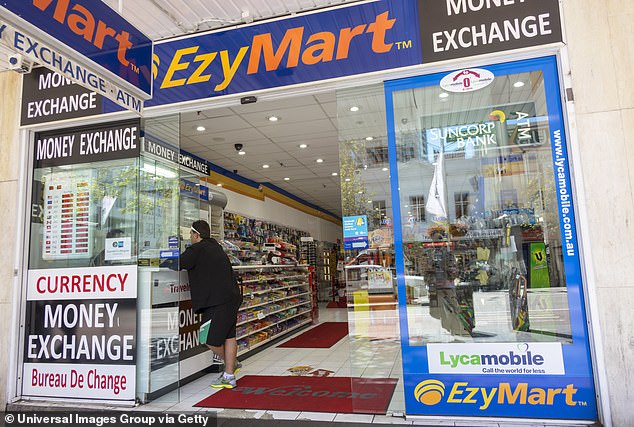

Some customers have criticized EzyMart, saying the prices are too high.
Last week, the two billionaire Australian families that own national retail subsidiary 7-Eleven sold the business to its Japan-based parent company.
The Withers and Barlow families, who are related, sold Australia’s 752 7-Elevens to 7-Eleven International LLC, 7IN, for $1.7 billion.
In a statement, former 7-Eleven Australia president Russell Withers said: “The Withers and Barlow families have had a proud association with the 7-Eleven brand since we brought it to Australia in 1977.
‘From a single store in suburban Melbourne, 7-Eleven has grown to a network of more than 750 stores in Victoria, New South Wales, ACT, Queensland and Western Australia, processing 250 million transactions each year and employing to more than 9,000 people around the world. Corporate and franchise network.
“Now is the right time for our families to pass the business on to new owners to continue building and developing this wonderful brand.”
In less than 50 years, 7-Eleven has managed to capture 32 per cent of Australia’s convenience store market.
However, there are currently no 7-Eleven stores in Tasmania, the Northern Territory or South Australia.
The branch’s new owner, 7IN, plans to open another 35 stores next year.
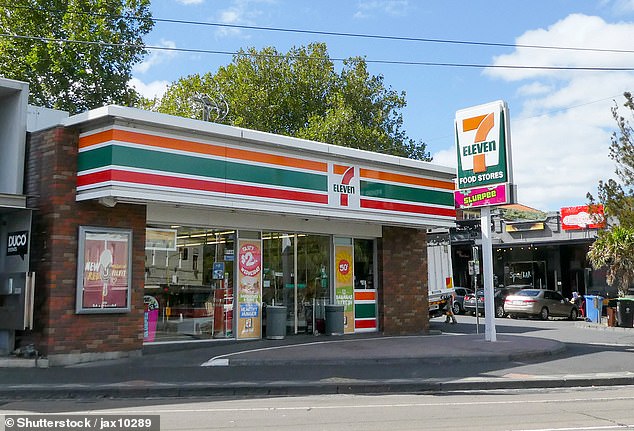

It comes amid struggles for competitor 7-Eleven, with the entire business sold to its Japanese parent company in early December.

